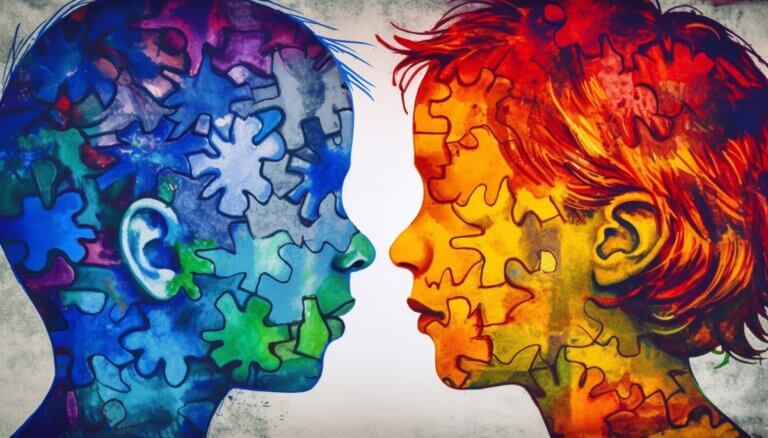Table of Contents
The Facets of Emotional Perception

Self-Perception of Own Emotions
Emotional intelligence begins with a fundamental building block – self-awareness of one’s own emotions. This competency forms the foundation for all other aspects of emotional intelligence such as self-regulation, motivation, empathy, and social skills. The ability to recognize, name, and understand one’s own emotions is crucial for building personal strength and interpersonal harmony.
The Importance of Emotional Self-Awareness
Exploring one’s own emotional world is more than just self-reflection – it is an act of courage. By learning to recognize the subtle nuances of one’s emotional state, one gains not only clarity about oneself but also the ability to control one’s own behavior. Understanding why one feels joy, sadness, or anger in certain situations enables one to make more conscious decisions and enhance one’s quality of life.
- Recognizing Patterns: Julia notices that the tension in her shoulders is a sign of stress and uses this signal to consciously take breaks during her workday.
- Naming Emotions: Tom identifies his frustration during a meeting and uses this insight to provide constructive feedback instead of reacting impulsively.
- Understanding the Context: Lea feels sadness when she recalls past experiences and understands that these past events influence her current reactions to similar situations.
Strategies to Improve Emotional Self-Awareness
To sharpen one’s emotional self-awareness, there are various strategies. Keeping an emotion diary, regular self-reflection, or mindfulness exercises are just a few methods to develop a deeper understanding of one’s own emotional patterns.
- Keeping a Diary: Recording thoughts and feelings can help to identify connections between triggering events and emotional responses.
- Meditation and Mindfulness: Through mindfulness practices, people learn to observe their emotions at the moment of their arising, without having to immediately react to them.
- Seeking Feedback: Discussing one’s emotional reactions with friends or colleagues can provide external perspectives and deepen self-understanding.
The ability for emotional empathy and the integration of Emotional Intelligence Empathy Understanding is significantly determined by the quality of self-awareness. A deep understanding of one’s own emotional responses is likewise the key to developing true compassion for others, thus enhancing one of the central pillars of Emotional Intelligence and Empathy.
The continuous work on one’s own emotional self-awareness is a lifelong process that significantly contributes to acting and reacting emotionally intelligently. In a world that is becoming increasingly complex and emotionally challenging, this ability is essential for securing professional success and personal well-being.
Recognizing Emotions in Others
Emotional intelligence and empathy play a crucial role in human interactions. If we are able to recognize the emotions of others and respond appropriately, we not only deepen our social relationships but can also avoid conflicts and promote cooperation.
The Art of Decoding Emotions
A smile, a raised eyebrow, a sighing breath – these are examples of nonverbal cues that open a window to the feelings of those around us. Experts in emotional intelligence with a profound understanding of empathy utilize these signs to develop a deeper understanding of others’ emotional states. Emotional empathy involves capturing these subtle signals and transforming them into social intelligence, which in turn lays the foundation for trusting, interpersonal relationships.
Imagine you are sitting in an important meeting. A colleague presents his ideas, but his shaky voice and evasive eye contact reveal insecurity. A person with high emotional intelligence and compassion recognizes these signs and can positively influence the situation through a supportive attitude or encouraging words, thereby improving the climate and boosting the team’s productivity.
- A central component of emotional intelligence is the ability to look beyond one’s own feelings.
- Practically applied empathy starts with the perception of small behavioral details.
- Advanced knowledge in interpreting body language can create synergies at the workplace and in personal relationships.
Successful Connecting through Emotional Intelligence
Effective communication is based not only on what is said, but also on how it is said. Emotional intelligence and empathy lead to a better understanding that behind every statement there is also an emotional message. Whether in customer conversations, parenting, or in a partnership – the accuracy with which we identify emotional states and respond to them significantly shapes the quality of our interactions.
An everyday example could look like this: Your partner comes home, their posture is dejected, their facial expression tired. An empathetic partner would perceive these signs and could respond to these nonverbal cues with understanding and support, rather than starting a discussion on everyday matters right away. This not only demonstrates emotional intelligence and understanding of empathy but also fosters mutual compassion and strengthens the relationship through supportive communication.
The value of recognizing and understanding emotions in our everyday lives cannot be overstated. It is a crucial tool for building, deepening, and maintaining relationships. By training our empathic abilities and understanding emotional intelligence, we create a foundation for a fulfilling coexistence and successful teamwork.
Emotional Intelligence in Application

Managing Emotions and Regulating Expression
Emotions are like the weather within us – constantly present, often changeable, and sometimes stormy. Emotional intelligence and empathy enable us not only to forecast this inner weather but also to set the sails correctly. Those who combine emotional intelligence and empathy skillfully navigate through the depths of human relationships.
Emotional Self-Control: The Anchor in Stormy Times
Imagine a heated discussion at the workplace threatens to escalate. Here, the ability for emotional self-regulation comes into play. Instead of reacting impulsively, it allows us to pause for a moment, recognize our own feelings, and perhaps even understand why the colleague reacts in such a way. Emotionally intelligent people are not only able to recognize their emotions but also express them appropriately.
- In conflict conversations, this means communicating calmly and clearly instead of loudly and aggressively.
- In a team context, emotional intelligence helps to foster motivation and enthusiasm instead of inciting frustrations.
- In leadership roles, pronounced empathy enables addressing the emotions of employees to create a supportive work climate.
The Importance of Emotional Intelligence in Private Life
In the private sphere, emotional intelligence plays just as crucial a role. A study conducted by Yale University has shown that couples who are able to articulate and understand their emotions experience higher satisfaction in their relationship. Emotional intelligence thus not only promotes harmony in everyday life but is also key to long-term happiness in partnerships.
- When dealing with children, emotional empathy helps to respond to their needs and to provide them with emotional security.
- Emotional intelligence and compassion are what enable us to support friends in difficult times without getting lost in their storms.
- In dealing with our own emotions, emotional self-control allows us to healthily process challenges such as loss or disappointment.
Real-Life Case Studies
For a practical example: A leader faces the challenge of giving negative feedback to a team member. With emotional intelligence and empathy understanding, she chooses a calm moment, explains the situation factually, and is open to the employee’s perspective. The result is a constructive dialogue instead of a defensive confrontation.
Or consider parents experiencing their child’s uncontrolled outburst of anger. Instead of reacting with their own frustration, they recognize the underlying needs and support the child in finding words for its feelings.
Whether in partnerships, friendships, or at the workplace – the ability to control our emotions and regulate our expression is one of the most powerful tools to build and maintain positive and lasting relationships. It is the art of navigating the stormy seas of life with skill and wisdom.
Shaping Positive Relationship Dynamics through Empathy
Emotional intelligence and empathy play a crucial role in the way we interact with others. Empathy, the ability to understand and appropriately respond to the feelings of others, is a cornerstone in building solid and enriching relationships. By learning to develop our empathic abilities, new ways open up to show understanding and compassion in our daily interactions.
The Importance of Empathy in Interpersonal Relationships
The ability to show emotional intelligence and empathetic understanding affects not only our personal relationships but also the workplace environment. Imagine a manager who not only recognizes the fears and concerns of his employees but also addresses them by creating a safe and supportive framework. Such an environment promotes satisfaction, productivity, and ultimately business success. Emotional empathy is thus not only an ethical mandate but also a key factor in economic success.
- Family members experience a deeper connection and improve the family atmosphere through mutual empathetic actions.
- Friends who show empathy can support each other in difficult times and enhance the quality of their relationship.
- Colleagues acting empathetically at the workplace contribute to an open, trusting, and cooperative corporate culture.
Empathy in Action – Practical Application
To show emotional intelligence and compassion means to practice active listening, rather than just focusing on one’s own speaking. Take the example of a conflict between friends: An empathetic approach would mean exploring the other’s perspective and acknowledging their feelings, which often already contributes to a de-escalation of the situation.
But how can empathy be fostered in everyday life? It begins with self-reflection and recognizing one’s own emotional states – this is the key to improving one’s empathy skills. Additionally, it helps to consciously pay attention to nonverbal cues and to put oneself in the position of others. Knowledge about these abilities and their targeted use keeps relationship dynamics flowing and positively shapes them.
By integrating empathy and emotional intelligence into our everyday interactions, we not only strengthen individual relationships but also contribute to a societal climate of understanding and care. It is worthwhile to continuously promote this aspect of personality development – for the benefit of ourselves and our fellow human beings.
Summary
Emotional intelligence and empathy are fundamental for interpersonal relationships and personal development. One of the first steps to cultivate emotional intelligence is self-awareness of one’s own emotions. This is the foundation for further skills such as self-regulation, motivation, and social competence. Building personal strength and harmonious relationships begins with the ability to recognize and understand one’s own feelings.
Strategies for Refining Emotional Self-Awareness
Various practices can help improve emotional awareness:
- Keeping an emotion journal illuminates patterns between events and emotional responses.
- Meditation and mindfulness exercises train the awareness of current feelings without immediately reacting to them.
- Feedback from others can complement our self-view and contribute to self-knowledge.
A mature emotional intelligence empathy understanding is essential for responding compassionately to others and contributes significantly to emotionally intelligent acting and reacting.
The importance of nonverbal communication is another aspect of emotional intelligence and empathy. Small gestures and postures reveal a lot about the emotional world of others. Emotional empathy allows us to respond to these signals and create synergies in social and professional interactions.
With emotional intelligence, we deepen our personal relationships and improve our coexistence. It helps us respond positively to the emotional states of our fellow human beings and use supportive communication paths. In the private sphere, it is evident that couples with high empathy ability often experience greater satisfaction in their relationship.
- Parents use emotional empathy to teach their child to express and understand their emotions.
- Friends who show compassion provide a stable social network in times of crisis.
- Emotional self-control helps us to deal healthily with life’s challenges.
Ultimately, Emotional Intelligence and Compassion is a skill that promises success both in private and professional areas. It strengthens togetherness and creates a basis for cooperative and effective work. Those who act empathically contribute to a healthy work environment and make an economic contribution to the company’s success. Integrating empathy and emotional intelligence into everyday life is the key to deeper, supportive, and lasting relationships. It is an indispensable tool for enhancing togetherness and safely navigating through turbulent times.
FAQ – Emotional Intelligence and Empathy
How does a person’s level of emotional intelligence affect their ability to show and feel empathy?
Emotional Intelligence (EI) is essential for practicing empathy, as it enables us to perceive, interpret, and appropriately respond to emotions in others. Individuals with high EI have a better ability to empathize and comprehend others’ emotions, facilitating deeper connections and interpersonal understanding. Conversely, a low level of emotional intelligence can lead to misunderstandings and conflicts, as the capacity to recognize emotional signals in others and respond empathetically is limited.
How does high emotional intelligence affect the ability to show empathy?
High emotional intelligence enables individuals to accurately recognize and understand emotions in themselves and others, promoting a deeper form of empathy where not only the emotions of others are grasped, but also appropriately responded to. This leads to empathetic people with high emotional intelligence often being perceived as understanding and compassionate, as they are capable of sensitively interpreting emotional signals and acting gently and supportively in their interactions.
To what extent does high emotional intelligence enhance the ability to empathize?
Emotional intelligence involves the ability to understand one’s own emotions and those of others, and to respond appropriately, creating the foundation for empathy. Individuals with high emotional intelligence are adept at recognizing emotional nuances and empathizing with the emotional worlds of others, enabling deeper interpersonal connections and a better understanding of others’ perspectives. This allows them to communicate more effectively and strengthen relationships in a way that is beneficial for all parties involved.




